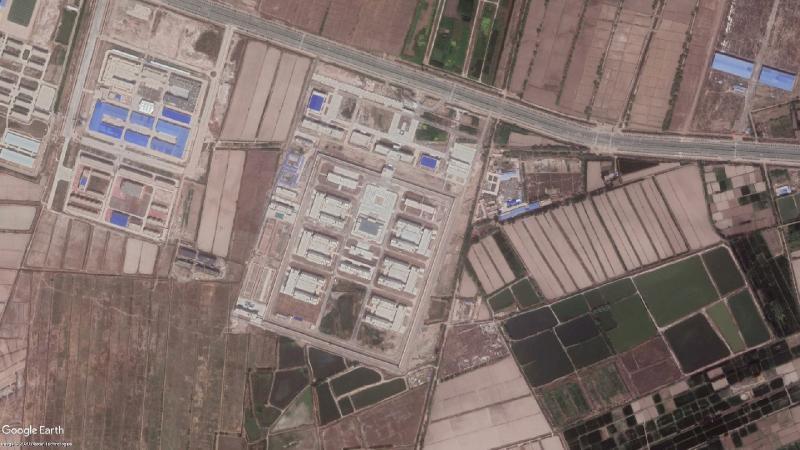China Secretly Built A Vast New Infrastructure To Imprison Muslims



China has secretly built scores of massive new prison and internment camps in the past three years, dramatically escalating its campaign against Muslim minorities even as it publicly claimed the detainees had all been set free . The construction of these purpose-built, high-security camps — some capable of housing tens of thousands of people — signals a radical shift away from the country’s previous makeshift use of public buildings, like schools and retirement homes, to a vast and permanent infrastructure for mass detention.
In the most extensive investigation of China’s internment camp system ever done using publicly available satellite images, coupled with dozens of interviews with former detainees, BuzzFeed News identified more than 260 structures built since 2017 and bearing the hallmarks of fortified detention compounds. There is at least one in nearly every county in the far-west region of Xinjiang. During that time, the investigation shows, China has established a sprawling system to detain and incarcerate hundreds of thousands of Uighurs, Kazakhs, and other Muslim minorities, in what is already the largest-scale detention of ethnic and religious minorities since World War II.
These forbidding facilities — including several built or significantly expanded within the last year — are part of the government’s unprecedented campaign of mass detention of more than a million people, which began in late 2016. That year Chen Quanguo, the region’s top official and Communist Party boss, whom the US recently sanctioned over human rights abuses, also put Muslim minorities — more than half the region’s population of about 25 million — under perpetual surveillance via facial recognition cameras, cellphone tracking, checkpoints, and heavy-handed human policing. They are also subject to many other abuses, ranging from sterilization to forced labor ...
“People are living in horror in these places,” said 49-year-old Zhenishan Berdibek, who was detained in a camp in the Tacheng region for much of 2018. “Some of the younger people were not as tolerant as us — they cried and screamed and shouted.” But Berdibek, a cancer survivor, couldn’t muster the energy. As she watched the younger women get dragged away to solitary confinement, “I lost my hope,” she said. “I wanted to die inside the camp.”
The compounds BuzzFeed News identified likely include extrajudicial internment camps — which hold people who are not suspected of any crime — as well as prisons. Both types of facilities have security features that closely resemble each other. Xinjiang’s prison population has grown massively during the government’s campaign: In 2017, the region had 21% of all arrests in China , despite making up less than 2% of the national population — an eightfold increase from the year before, according to a New York Times analysis of government data. Because China’s Communist Party–controlled courts have a more than 99% conviction rate, the overwhelming majority of those arrests likely resulted in convictions.
People detained in the camps told BuzzFeed News they were subjected to torture, hunger, overcrowding, solitary confinement, forced birth control, and a range of other abuses. They said they were put through brainwashing programs focusing on Communist Party propaganda and made to speak only in the Chinese language. Some former detainees said they were forced to labor without pay in factories.
The government heavily restricts the movements of independent journalists and researchers in the region, and heavily censors the internet and its own domestic media. Muslim minorities can be punished for posts on social media. But satellite images that are collected from independent providers remain outside the scope of Chinese government censorship.
Other kinds of evidence have also occasionally leaked out. In September, a drone video emerged showing hundreds of blindfolded men with their heads shaven and their arms tied behind their backs, wearing vests that say “Kashgar Detention Center.” Nathan Ruser, a researcher at the Australian Strategic Policy Institute who has done extensive satellite imagery analysis of the detention and prison systems in Xinjiang, said the video shows a prisoner transfer that took place in April 2019 — months after the government first said the system was for vocational training. Previous analyses, including by the Australian Strategic Policy Institute in November 2018, identified several dozen early camps.
“The internment and assimilation program in Xinjiang has the overall logic of colonial genocides in North America, the formalized racism of apartheid, the industrial-scale internment of Germany's concentration camps, and the police-state penetration into everyday life of North Korea,” said Rian Thum, a scholar of the history of Islam in China at the University of Nottingham.
The campaign has done deep damage to many Muslim minority groups — but especially Uighurs, who are by far the most populous ethnic minority group in Xinjiang and do not have ties to any other country. The Chinese government has heavily penalized expressions of Turkic minority culture, from Kazakh- and Uighur-language education to the practice of Islam outside of state-controlled mosques. This, combined with forced sterilizations, has led some critics to say that the campaign qualifies as genocide under international law . The Trump administration is reportedly discussing whether to formally call it a genocide, and a spokesperson for Joe Biden, the Democratic nominee for president, said on Tuesday that Biden supports the label.







Incredibly depressing this is happening in 2020.